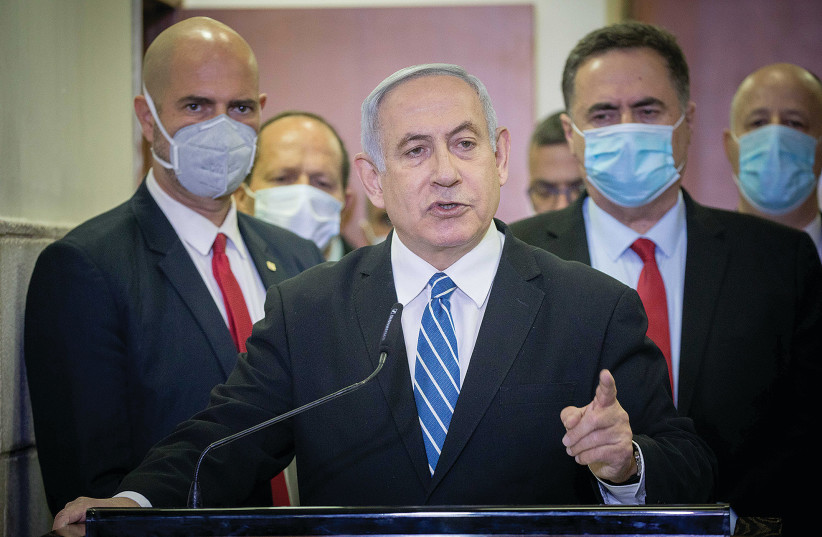The Likud’s primary elections will be held on either August 1 or 2. A number of ex-Likud MKs and new figures said they were going to run.
The Likud’s list to the Knesset consists of four different components. The first is the list chosen in national primaries. The second is representatives of its 10 regions. The third is a number of “minority” slots that are also chosen in the national primary but in a separate category. These include a slot for a new immigrant, a slot for a woman who has not previously served as an MK, and others.
The fourth category is the Likud leader’s personal choices, known as “shiryunim.” The leader receives approximately three slots that have a realistic chance of making into the Knesset.
These shiryunim will most likely go to Yamina deserters Amichai Chikli, Idit Silman and Nir Orbach, a source in the Likud said. Unlike Silman and Orbach, Shikli legally cannot run in the Likud since he was officially deemed a deserter by the Knesset Committee. The law bars official deserters from running in existing parties in order to disincentivize MKs from switching parties after an election. While Silman is considered a lock in the Likud list, Orbach has not made up his mind whether he will join Likud, the source said.
While new Likud candidates may run as representatives of the different regions, current or former Likud MKs are only allowed to run in the national primary. The regional representatives are chosen by the Likud Central Committee, its “legislative” body of over 3,000 members. This ensures that newcomers will have a fair chance of making it onto the list, a source from the Likud said.

A number of current Likud MKs are pressuring the Central Committee to allow them to run as regional representatives since they are worried that they will lose their seats in the national primary, the source said. However, this is not expected to change.
Danny Danon
The most significant name that is rejoining the race is Danny Danon, Israel’s ambassador to the UN from 2015-2020.
Danon served as a Likud MK from 2009-2015 and in a number of ministerial roles, including Science, Technology and Space minister; deputy minister of Defense; and head of the Knesset’s Immigration, Absorption and Diaspora Affairs Committee. Danon intends to use his experience overseas to his advantage, he said.
While Danon ran against current Likud leader Benjamin Netanyahu in 2014, he will not challenge Netanyahu in this cycle. While echoing other Likud MKs who argued that the Bennett and Lapid-led governments were a danger to Israel as they depended on the Muslim Brotherhood, Danon also said that he was involved in opposing US President Joe Biden’s plan to visit east Jerusalem during his visit to the country next week. This showed his experience in foreign affairs and in dealing with US pressures, and is something that differentiated him from other Likud MKs, he said.
Moshe Feiglin
Former MK and head of the Zehut Party Moshe Feiglin announced on Sunday that he would also be running. Feiglin, 59, served as a Likud MK from 2013-2015 before forming his own party. His platforms in the past included a mix of libertarianism and far-right nationalism. Feiglin was also known for promoting the legalization of marijuana.
“For years I have been fighting for Israel’s existence as a Jewish state, fighting the High Court of Justice and the extreme Left, fighting for [Israeli] sovereignty over Jerusalem and the Temple Mount, and I promise all of the Likud voters that I will never give up these struggles.
MK Naama Lazimi immediately criticized Feiglin.
“To the Likud, which has trampled democracy in recent years, returns Feiglin – the link connecting Netanyahu and Ben-Gvir, extremist messianic [politicians] who promote a halachic state and apartheid,” Lazimi wrote.
Other than Danon and Feiglin, a third important ex-Likud MK who may consider running in the primary is current Israel Ambassador to the UN Gilad Erdan. Erdan served as a member of the Knesset for Likud between 2003 and 2020 and held several ministerial positions, including minister of Environmental Protection (2009–2013), Communications (2013–2014) and Public Security (2015–2020). Erdan has until July 24 to decide if he wants to run. This is because state employees are not allowed to run for the Knesset unless they quit their jobs 100 days or more prior to the election.
